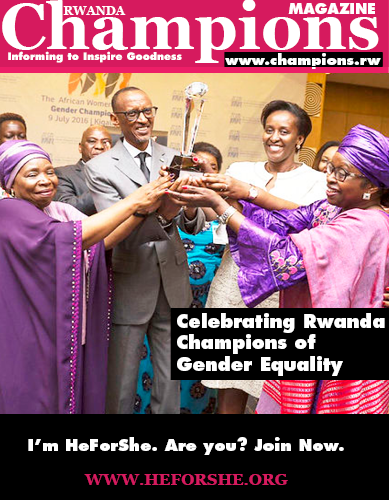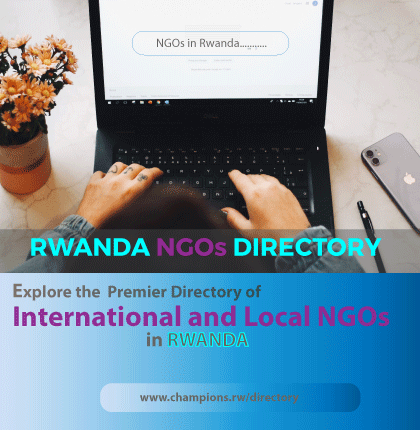UN Women Rwanda launches $6.3 million plan to boost women’s empowerment
UN Women Rwanda has launched a new four-year strategic plan that will require about $6.3 million to expand programs (…)

By Bosco Kagaba
Rwanda has committed to bridging gender digital divide and attaining parity in ICT access, usage, and innovation by 2020 as one of the three commitments made under HeForShe solidity movement for gender equality. Once this commitment is fully met, Rwanda will have a critical mass of tech savvy women who are capable of utilizing their knowledge, talent and other resources to engineer women-led innovations that are critical for creating self-employment to spur economic development.
Encouraging more women to enroll in ICT access, usage and innovation is already happening. Although most of the initiatives in the ICT sector that target women are initiated by the government, the private sector, academia and other partners in the development of the ICT sector have started coming on board.
What is being witnessed is a new wave of change that is driving girls right from primary to secondary and tertiary education to embracing ICT not only as a source of knowledge but also as an area that is also truly fit for women to explore and learn new skills that would be the foundation for self-empowerment.
And going by the popular saying: “If you educate a man you educate an individual, but if you educate a woman you educate a nation” Rwanda is truly making the right steps in the right direction when it comes to educating the girl child and empowering women through ICTs. Due to the government commitment to developing the ICT sector and providing equal opportunities for both girls and boys to access education, some girls who embraced ICT are already making a huge impact by encouraging other girls to follow.
Take an example of the popular names such as Clarisse Iribagiza, the founder of HeHe Ltd, a Rwandan technology company and Lillian Uwintwali, the Chief Executive Officer of M-Ahwiii Ltd which developed an application that is helping farmers to boost productivity. These two tech-entrepreneurs have become icons for other girls who aspire to become entrepreneurs more especially in the ICT sector. They have literally influenced the way girls think of ICT.
Lillian Uwintwali says that her mobile app helps farmers to send and receive vital agricultural information using sms and she urges more girls to embrace ICT to better their lives and contribute to the country’s economic development. She says girls and women in general are poised to become successful just like men and sometimes perform better than men if they embrace ICT.
Because of Rwandan female technology influencers such as Clarisse Iribagiza and Lillian Uwintwali, we have also witnessed the birth of Ms Geek. As opposed to the Miss Rwanda, which is literary a beauty contest, Ms. Geek seeks to make girls love the beautiful side of ICTs because it matters. It is a competition that seeks to empower girls to enroll in technology and science related education fields. In the organisers’ own words, “The MsGeek is an annual competition designed to inspire female university/TVET students to think critically and design solutions to issues faced by Rwandans today. In this competition, young women compete based on the innovative ideas as well as their ability to develop a certain technology or develop a business idea. The purpose of MsGeek is to demonstrate that girls and young women can also excel in the technologies and build their confidence in competing in the open market.”
Ms. Geek is part of a broader initiative known as Girls in ICT Rwanda. According to Girls in ICT Rwanda website www,girlsinict.rw , the Girls in ICT Rwanda initiative comprises of a group of women, young and old – professionals and students, who are passionate about STEM( Science, Technology, Engineering and Math) and have come together to inspire more girls to join these exciting fields. It was founded in December 2011 when Rwanda decided to join the rest of the world in celebrating the international ITU (International Telecommunication Union) Girls in ICT day which happens every last week of April.
Girls in ICT Rwanda goal and mission is to improve the current statistics regarding the numbers of women in the ICT sector as well as to alter the stereotype held by many young girls that ICT is a man’s field. With this aim, the group has organized several events to encourage girls to study ICT such as the Ms. Geek Rwanda competition, which targets girls in higher institutions of learning, and Girls in ICT day exclusively meant for High school girls. Girls in ICT as a group has grown to incorporate women in various sectors that touch ICT and these women have been at the forefront of the events and campaigns that are carried out throughout the country.
Girls in ICT Rwanda besides organizing Ms Geek, the group also organizes TechKobwa BootCamp, a one week bootcamp where high schools girls especially from remote high schools where the access to technology and computer is very limited. During the week, the girls have the chance to learn basic programming, internet and other computer skills. They also have access to mentors from various sectors who help them discover the good things about technology. Techkobwa is an initiative of Peace Corps with Girls in ICT in partnership with Klab and other stakeholders. Girls in ICT Rwanda also conducts awareness campaigns throughout the country mostly in high school. These campaigns consist of our members educating these girls about various career paths in STEM fields and sharing their own experiences. The campaigns are organized in partnership with the Ministry of ICT and Youth.
Rosine Mwiseneza, the winner of Ms Geek 2016, looks at ICT as an enabler for economic development.
She says ICT is a central engine to driving Rwanda’s transformation to a knowledge based economy.
Mwiseneza says ICT is one of the biggest employers in Rwanda and it has the potential to boost productivity in sectors like agriculture by improving food production and households’ earnings.
The minister of Youth and ICT, Jean-Philbert Nsengimana says young girls should maximize the available ICT infrastructure to unleash their potential. Nsengimana observes that there is still a significant gap between men and women in ICT, signaling that the number of girls in the sectors is still low.
He notes that as a result, his ministry is focusing more on empowering girls to embrace and exploit available technologies and called up on them to maximize opportunities that the technologies offer in today’s world.
“Knowledge is power and wealth,” Nsengimana noted adding that embracing ICT will fast track the country’s economic development. He also notes that by encouraging and investing in the promotion of ICT, with a specific focus on women, the country will be able to speed up its quest to becoming a knowledge-based economy and positioning it as an ICT hub in the region.
“ICT gives opportunities that were not there in the past and helps create more new jobs that couldn’t be generated if the technologies were not there,” Nsengimana argues.
Jerome Gasana, the Director General of Workforce Development Authority (WDA) says having girls embracing ICT will help them become more innovative and sharpen their entrepreneurship skills.
Gasana says government is ready to provide the necessary support for start-up materials in ICT to be able to create new jobs as is prescribed in the second development and poverty reduction strategy (EDPRS2).
“The country wants to be an ICT hub and this requires everyone’s involvement especially women to Create companies and be the catalyst of development in ICT,” he says adding that this may as well set a firm foundation for made in Rwanda products.
Rose Rwabuhihi, Rwanda’s Chief Gender Monitor at Gender Monitoring Office (GMO) says girls must use ICT as a noble tool to develop the country.
“The country counts on them to tap into ICT and develop the country”, she argues, saying that this will greatly help empower women economically and increase their contribution to the national economy.
Bridget Umurerwa, an information technology (IT) graduate says IT has helped her acquire additional practical skills enhancing her capacity to create jobs for the jobless youth.
Eng. Pascal Gatabazi, the Principal of Tumba College of Technology, one of the ICT training institutions set up by the government says his institution plans to boost access to information using ICT.
“We plan to create a forum where we can exchange news on what has been the impact of ICT among those who passed here for training,” he says.
UN Women Rwanda has launched a new four-year strategic plan that will require about $6.3 million to expand programs (…)
UN Women Rwanda has launched a new four-year strategic plan that will require about $6.3 million to expand programs (…)
African women leaders are calling for greater solidarity and collaboration to help more women attain leadership (…)
Women for Women International (WfWI) has appointed Nigerian development expert Thelma Ekiyor as its new global chief (…)

